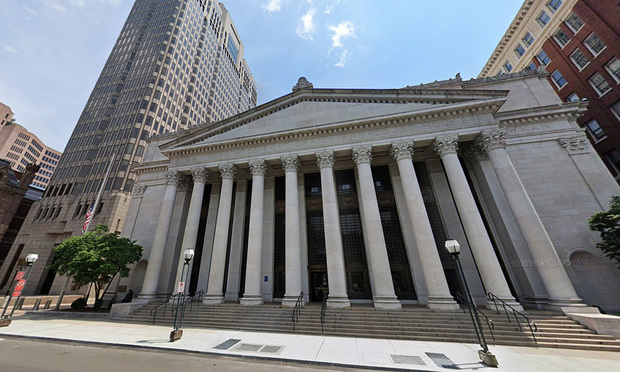Legal Fight Brews Over Ownership of Jackson Pollock Artwork in Connecticut
A federal lawsuit alleges a Greenwich man has refused to return a $175,000 piece of art by the famed artist.
July 27, 2020 at 03:10 PM
4 minute read
 U.S. District Court District of Connecticut courthouse in New Haven. Photo: Google
U.S. District Court District of Connecticut courthouse in New Haven. Photo: Google
A federal lawsuit alleges a Greenwich man engaged in "statutory theft" by refusing to return a Jackson Pollock artwork reportedly worth $175,000.
The lawsuit, filed July 22 in U.S. District Court in Connecticut, alleges "The Collage" was created by the famed artist in 1943 and was purchased from a New York art gallery in 1978 by Mary Mochary, the mother of California plaintiff Matthew Mochary.
The lawsuit states Mary Mochary would loan the artwork to various institutions in the United States and around the world. It also said Mary Mochary began gifting her son fractional shares of ownership of the piece until her son had complete ownership in 2012.
Under a loan agreement with the Kasser Foundation, both Mocharys agreed to lend the artwork to the foundation, who then loaned the piece to various entities, including the Museum der Moderne in Salzburg, Austria, and the Tuscon Museum of Art in Arizona.
After a loan to an art museum in Florida ended in 2016, the lawsuit said the piece was loaned to Alexandra Bergstein, also known as Alexandra Kasser, a family member of the Kasser Foundation. The loan was contingent that the art be insured and properly cared for.
In 2019, Alexandra Bergstein began divorce proceedings against her husband, Seth Bergstein, a top executive at Morgan Stanley. Alexandra Bergstein, as part of the divorce agreement, no longer lives with her husband in Greenwich, where the artwork remains.
On May 4, the lawsuit says, Matthew Mochary notified Seth Bergstein he wanted the artwork back within 30 days. Bergstein, the lawsuit says, not only didn't return the Pollock piece but also hasn't maintained it in a safe manner.
The lawsuit claims Bergstein "is storing or displaying the piece in direct sunlight and is not regulating the temperature or humidity of the environment, subjecting the collage to sharp fluctuations of temperature and humidity."
The lawsuit says Mochary "has the right to immediate possession" of the artwork.
Art expert Wendy Battleson, who is not involved in the litigation, said it's quite common for art owners to loan their pieces to museums and art exhibits, but not to private individuals.
Battleson, an art law attorney with Sanborn & Battleson, had previously worked for 10 years at Christie's Inc., most recently as its senior vice president and global head of art finance.
Battleson said Monday, "I don't understand why this piece was loaned to an individual. It's very odd that it went to a museum and then back to a private house. There is no real benefit to the owner of having it sit in someone's home."
Battleson said the plaintiff "absolutely has a good case here. The challenge is does he have proof he is the owner. There does not seem to be any reason for Mr. Bergstein to still retain it."
Battleson said having art displayed or loaned helps drive up the value of the piece.
Battleson continued: "Typically, when a piece of art is loaned there is a condition report drafted by an art expert. It details everything about the painting in terms of colors, repair work, etc. If it comes back in a different condition, the insurance company would determine the loss in value based on damages."
Representing the plaintiff are Steven Frederick and Zachary Phillipps, both with Wofsey, Rosen, Kweskin & Kuriansky. Neither attorney responded to a request for comment Monday.
As of Monday afternoon, Bergstein had not retained an attorney. Bergstein has an unlisted telephone number and couldn't be reached for comment.
Read more:
Five Questions: Von Sanborn on Art Law, Insurance and the IRS
This content has been archived. It is available through our partners, LexisNexis® and Bloomberg Law.
To view this content, please continue to their sites.
Not a Lexis Subscriber?
Subscribe Now
Not a Bloomberg Law Subscriber?
Subscribe Now
NOT FOR REPRINT
© 2025 ALM Global, LLC, All Rights Reserved. Request academic re-use from www.copyright.com. All other uses, submit a request to [email protected]. For more information visit Asset & Logo Licensing.
You Might Like
View All
Trump's DOJ Delays Releasing Jan. 6 FBI Agents List Under Consent Order
3 minute read

DC Lawsuits Seek to Prevent Mass Firings and Public Naming of FBI Agents
3 minute read
Law Firms Mentioned
Trending Stories
- 1How Alzheimer’s and Other Cognitive Diseases Affect Guardianship, POAs and Estate Planning
- 2How Lower Courts Are Interpreting Justices' Decision in 'Muldrow v. City of St. Louis'
- 3Phantom Income/Retained Earnings and the Potential for Inflated Support
- 4Should a Financially Dependent Child Who Rejects One Parent Still Be Emancipated?
- 5Advising Clients on Special Needs Trusts
Who Got The Work
J. Brugh Lower of Gibbons has entered an appearance for industrial equipment supplier Devco Corporation in a pending trademark infringement lawsuit. The suit, accusing the defendant of selling knock-off Graco products, was filed Dec. 18 in New Jersey District Court by Rivkin Radler on behalf of Graco Inc. and Graco Minnesota. The case, assigned to U.S. District Judge Zahid N. Quraishi, is 3:24-cv-11294, Graco Inc. et al v. Devco Corporation.
Who Got The Work
Rebecca Maller-Stein and Kent A. Yalowitz of Arnold & Porter Kaye Scholer have entered their appearances for Hanaco Venture Capital and its executives, Lior Prosor and David Frankel, in a pending securities lawsuit. The action, filed on Dec. 24 in New York Southern District Court by Zell, Aron & Co. on behalf of Goldeneye Advisors, accuses the defendants of negligently and fraudulently managing the plaintiff's $1 million investment. The case, assigned to U.S. District Judge Vernon S. Broderick, is 1:24-cv-09918, Goldeneye Advisors, LLC v. Hanaco Venture Capital, Ltd. et al.
Who Got The Work
Attorneys from A&O Shearman has stepped in as defense counsel for Toronto-Dominion Bank and other defendants in a pending securities class action. The suit, filed Dec. 11 in New York Southern District Court by Bleichmar Fonti & Auld, accuses the defendants of concealing the bank's 'pervasive' deficiencies in regards to its compliance with the Bank Secrecy Act and the quality of its anti-money laundering controls. The case, assigned to U.S. District Judge Arun Subramanian, is 1:24-cv-09445, Gonzalez v. The Toronto-Dominion Bank et al.
Who Got The Work
Crown Castle International, a Pennsylvania company providing shared communications infrastructure, has turned to Luke D. Wolf of Gordon Rees Scully Mansukhani to fend off a pending breach-of-contract lawsuit. The court action, filed Nov. 25 in Michigan Eastern District Court by Hooper Hathaway PC on behalf of The Town Residences LLC, accuses Crown Castle of failing to transfer approximately $30,000 in utility payments from T-Mobile in breach of a roof-top lease and assignment agreement. The case, assigned to U.S. District Judge Susan K. Declercq, is 2:24-cv-13131, The Town Residences LLC v. T-Mobile US, Inc. et al.
Who Got The Work
Wilfred P. Coronato and Daniel M. Schwartz of McCarter & English have stepped in as defense counsel to Electrolux Home Products Inc. in a pending product liability lawsuit. The court action, filed Nov. 26 in New York Eastern District Court by Poulos Lopiccolo PC and Nagel Rice LLP on behalf of David Stern, alleges that the defendant's refrigerators’ drawers and shelving repeatedly break and fall apart within months after purchase. The case, assigned to U.S. District Judge Joan M. Azrack, is 2:24-cv-08204, Stern v. Electrolux Home Products, Inc.
Featured Firms
Law Offices of Gary Martin Hays & Associates, P.C.
(470) 294-1674
Law Offices of Mark E. Salomone
(857) 444-6468
Smith & Hassler
(713) 739-1250










